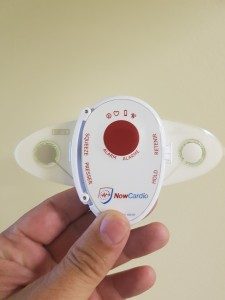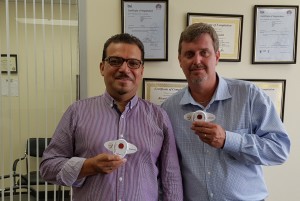At first glance, cardiology and aerospace seem to be two pieces of separate puzzles. Yet, with a growth rate of 400 per cent in the past year, Mississauga-based engineering company Contex Canada has proven that the two can be merged into a successful business.
The crossover is due to the extensive experience and education of Richard Smith, CEO, and Ricardo Rodriquez, COO.
After completing a degree in Computer Science at Memorial University and later a Ph.D at Innova University, Smith co-founded Tricom Technologies. There, he developed and manufactured military and commercial flight simulators until the successful sale of his company 12 years later.
“For whatever reason, I kind of got disenchanted with it,” he recalls.
Smith’s newfound freedom led to a three year stint in Silicon Valley and another three years at a different Toronto company, where he began to gain perspective into the life sciences industry.
“You look at cardiology, and heart failure is the leading cause of death worldwide, number one,” Smith says. “It’s an area in particular when it comes to diagnostics and monitoring that really hasn’t undergone that much innovation for a very long period of time.”
“It can certainly benefit from, and that you can make a dramatic difference in, with an injection of modern technology,” he adds. “That part was the draw.”
Having worked with the Event Cardio Group for five years, Smith saw a huge need for advancement in cardiology.
“I’d been having a vision of being able to update and modernize the traditional heart monitor,” he says.
In order to realize this vision, Smith needed help. And he remembered Ricardo Rodriguez, a talented individual who had been his manager of electrical engineering at his aerospace company.
“I reached out to [Ricardo] and said, ‘Hey, I’m back from Silicon Valley and I think your knowledge would be a great asset, because we’re going to break some ground here on technology that doesn’t currently exist in the cardiology world’,” Smith recalls.
The result is NowCardio, a non-invasive continuous heart monitoring device. Leadless and wireless, the monitor provides auto detection and reporting of arrhythmia anomalies.
“The fact is that the medical device industry is heavily underserved within the new trends of technology,” says Rodriguez. “We’re used to developing technologies for aerospace, and now we’ve found that the medical industry is underserved. There’s no great deal of new technology, yet the demand is growing faster than what the offer is putting out.”
In order to meet this unmet medical need, NowCardio pushes the boundaries of cardiac patient care. Combining Holter, Event and Mobile Cardiac Telemetry into a single device, NowCardio allows for extended monitoring periods to gather and analyze data. Using the monitor, physicians can more accurately diagnose cardiac arrhythmias such as atrial fibrillation.
“We came into existence pretty much to develop and perfect [NowCardio] and that has probably accounted for about eighty per cent of what we do,” says Smith.
As for the other twenty per cent, it seems old habits die hard for Rodriguez and Smith.
“Once we were up and running here, we were actually contacted by certain customers and people looking for aerospace services because we’ve been very good in that field in the past,” Smith explains with a laugh. “It’s like, as hard as I try they won’t let me out!”
Not ones to turn down opportunity when it comes knocking, Smith and Rodriguez continue to produce simulator equipment and services alongside their heart monitor.
“In all seriousness,” Smith adds, “it’s still great stuff, and we pride ourselves on aerospace.”
“We come from a long line of working together in the aerospace industry,” says Rodriguez. “We served a number of customers around the world with flight training devices. That was the premise for us to establish a new business.”
Merging the two industries, they report, has proven to be seamless.
“There’s a lot of crossover,” Smith explains. “Aerospace is a highly regulated industry where you’re making mission-critical systems that have a life or death outcome. The same rigour that goes into the design and the control of an aerospace project translates very well in the medical space. So there’s no culture shock on the regulatory side, although there are differences.”

The business is entirely run out of Mississauga, a city that the two claim has been critical for their success.
“We benefit from a lot of local suppliers and that is very convenient landscape for us to be in,” says Rodriguez. “We’re finding that there’s a readily industrial area where we can have our products prototyped and manufactured successfully.”
“It’s also got great networking and access to companies that have helped us on our journey,” adds Smith. “I’m really supportive of the City of Mississauga – they’re taking the life sciences area very seriously.”
Just as Mississauga has provided opportunity, Smith and Rodriguez hope to return the favour.
“Most of our employees are also local,” Rodriguez explains. “So we’re generating an economic movement by hiring people from Mississauga. To us, that’s also fundamental.”
As for what’s next, Smith and Rodriguez are sticking to the old mantra of not fixing what isn’t broken.
“We’re looking to stay in Mississauga and creating some jobs and dramatic growth with Contex in the next couple of years,” says Smith.

